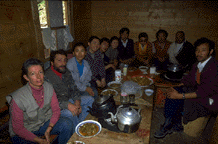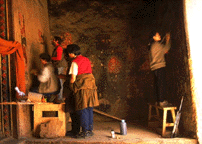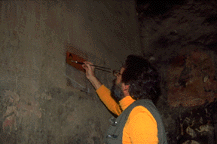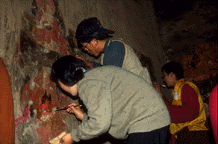click on small images to view full screen with caption
 |
| 1995 Field team enjoying camaraderie at mealtime. |
"Giving the gods a bath--that's what we're doing" says Deshi Yangjing brightly as she carefully applies weak solvent to a 270-year-old Tibetan mural painting. She is one of our group of five mural conservation apprentices: the first Tibetans in Sichuan to learn the science of restoration. This week-long course at Baiya Monastery is only an introduction--to master the art will take months of hard study and practice. But already she and her classmates have learned some simple cleaning techniques, and they are now busy resurrecting Buddhist deities whose faces for a century have lain under grime and soot.
 |
| Conservation experts and apprentices clean murals at the entrance to Baiya. |
To make this mural conservation training program has meant a lot of hard travel for everyone. Critical to the scheme are our two foreign experts, Donatella Zari and Carlo Giantomassi, who have journeyed from Rome all the way here to the Tibetan plateau. On the way up we stopped at Kangding, capital of Ganzi Tibetan Autonomous Prefecture, where the two lectured on conservation to local art students and teachers. In Kangding we also picked up Deshi Yangjing, daughter of a prominent local artist, and one other student. Three more are from Baiya's local area--"local" meaning that they live less than three days away, for Baiya is accessible only on foot or horseback. Now assembled here in this remote and beautiful valley, the students are eagerly learning conservation from their Italian teachers.
 |
| Carlo Giantomassi cleans a mural at Baiya. |
Spread over the temple floor is a combination doctor's office and chemistry lab, for cleaning ancient murals is not unlike treating a sick old man. Bottles of solvent, tissue paper, gauze, cotton swabs, paint brushes, and half a dozen different kinds of glue are stocked in our small pharmacy. Slowly and carefully, Carlo and Dona test various cleaning techniques, starting with plain water and then trying stronger solvents to find the optimum combination that separates color from dirt. The students ask a thousand questions, and make careful notes.
 |
| Apprentices clean a mural at Baiya Monastery. |
The climax of our week-long course is a detachment test--an attempt to actually remove a small section of mural from the clay wall. This procedure, Dona explains, is necessary because the walls are buckling, and because needed work on the monastery roof will put the murals in great danger. To fully detach two walls' worth of murals will require two months, and this must deferred until next year while we raise the necessary funds. When we return the students will help with the work; eventually the brightest of them will be able to repair murals on their own.
For three days they apply layers of cloth and glue to a poster-sized section of mural. Then the moment of truth comes. Everyone holds their breath as Carlo and Dona carefully peel the mural from the wall. When it's free we can see that the clay separated cleanly, and no color was left behind--success!
By the time we're ready to ride away from Baiya, our team is like one big happy family. As manager of this project, the fun part of my job is over. Now I must begin the difficult job of fund-raising; not only for the mural detachment mission next year, but also to repair the building itself. One thing is certain: I am determined to return to Baiya Monastery
